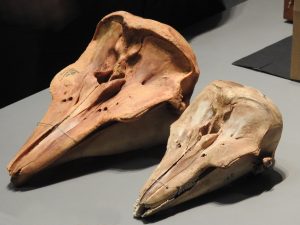
Photo ID of Harbour Porpoise
We want to photo-ID porpoises. Harbour porpoise are notoriously difficult to identify due to the small size of dorsal fin and the relatively little time they spend on the surface. However, it can be done if we can manage to capture as much detail of the animal as possible in a high-resolution picture.
If the same animals return to a spot, we know it’s an important habitat! To identify porpoises, we need a fast camera that performs well in all conditions, yet is lightweight enough to carry for many hours in field conditions.
We are looking to purchase two high-performance compact Sony RX10 IV cameras to equip our marine mammal observers with. With necessary accessories (protective gear, additional batteries), this should cost about US$ 2,200 (CA$ 3,000).
That camera also records high-resolution video, and we would like to use it to record content for our website and education programs as well.

Props for our Education Program
We want to bring science and porpoises into the classroom! We are currently assembling “porpoise kits” for use in our education program. Each kit will contain props such as skull replicas, and the plan is to loan these kits to schools in Canada and the United States (for now), which will include fully developed lesson plans and presentations.
We already have props for one kit for a pilot project, but skulls replicas are expensive, and cost roughly US$ 400 (CA$ 530) each.
Windows Tablet Computers for Data Recording in the Field
For our land-based study of harbour porpoise, we depend on a custom-developed Windows application that we run on a Microsoft Surface tablet. We would like to also use this software as we expand our research project to other locations, and we are looking to purchase more Windows tablets, costing about US$ 550 (CA$ 720) each.
Wind- and Rainproof Clothing for our Volunteers
Our volunteer marine mammal observers spend all year looking for and observing porpoises – whether that happens on a hot summer day, or on a cold December morning in freezing temperatures. While in the summer, a t-shirt and some sunscreen is all it takes, we would to provide our volunteers with weather-proof clothing to help them through the cold fall and winter season.